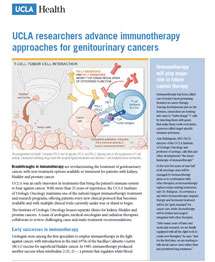Kidney Cancer
UCLA Institute of Urologic Oncology
Kidney Cancer Research Program
The David Geffen School of Medicine at UCLA is ranked third in the U.S. in research dollars and ninth in research funding from the NIH. The UCLA Institute of Urologic Oncology has one of the largest and most diverse urologic oncology research programs in the nation.
The UCLA Institute of Urologic Oncology is committed to ongoing kidney cancer research in a quest to develop new treatments and cures for all kidney cancer patients, along with a commitment to educate and train the next generation of leading physician-scientists. The UCLA IUO is conducting pioneering basic (bench) research, cutting-edge translational research (bench to bedside) and offering newly-designed clinical trials for kidney cancer.

Clinical Update:
UCLA researchers advance immunotherapy approaches for genitourinary cancers >
Significant Kidney Cancer Research Achievements at UCLA:
A campus-wide effort to focus on kidney cancer led by researchers working within The UCLA Institute of Urologic Oncology and a broad array of departments across the UCLA campus has led to significant research discoveries and achievements with potential major impact on patients with kidney cancer. Examples of these discoveries and achievements include:
- Results of the S-TRAC clinical trial were published by UCLA IUO physicians in the New England Journal of Medicine, showing that this was the first study to help prevent recurrence of high-risk tumors after surgery for localized kidney cancer.
- The discovery of the importance and utility of CAIX, a novel kidney cancer gene, for use in diagnosis, vaccine therapy, and selection of patients for clinical trials.
- The construction of a novel hybrid-fusion molecule, CAIX-GM-CSF, currently being used as an investigational cancer immunotherapy vaccine for patients with advanced kidney cancer.
- For 25 years, UCLA has been at the forefront for testing and using immunotherapy approaches to the treatment of kidney cancer, including the use of interferon, high-dose interleukin 2, engineered T cells, cancer vaccines, and the latest form of immunotherapy using checkpoint inhibitors, which have recently been approved for both advanced kidney and bladder cancers.
- The development of the UCLA Integrated Staging System (UISS), making it possible to use statistical tools that can accurately define an individual kidney cancer patient’s probability of survival. Many clinical trials now routinely use the UISS to determine patient eligibility to participate in clinical trials.
- Development of adoptive TIL therapy for patients with advanced kidney cancer; cell expansion and preparation done by UCLA research scientists.
- Development of an experimental kidney cancer tumor model, LABAZ 1 & 2, in the laboratory for pre-clinical testing.
- Arie Belldegrun, MD, was one of the leaders in a novel technology that essentially renders the body transparent and allows physicians to determine whether gene therapies reach targeted cells and work as they should.
- Dennis J. Slamon, M.D., Ph.D., chief of the UCLA Division of Hematology/Oncology and whose research led to the development of the breast cancer drug Herceptin, leads a drug discovery and screening program aimed at the identification and testing of novel drugs and targets for kidney, bladder, and prostate cancers.
The UCLA IUO will continue to apply the diversity of talent on the UCLA campus to the critical and evolving translational challenges in the field of kidney cancer.
Current Kidney Cancer Research Projects include:
- Cancer vaccines designed to trigger an immune response against tumor cells.
- Monoclonal antibodies—molecules engineered to cause cancer-cell death in various ways, such as by blocking signaling pathways needed for tumor growth.
- Cytokines—proteins that stimulate a broad-based immune response
- Viruses engineered to destroy tumors and prime the immune system to continue fighting off cancer.
- Novel genes (non-coding RNAs) that serve as potential therapeutic targets and immune-system regulators.
- Gene and immune therapies for kidney cancer
- Molecular and genomic characterization of kidney cancer
- Development of a panel of diagnostic microRNAS (miRNAs) that are measurable in patients’ blood and can be able to identify kidney cancer in its earliest stages. MicroRNAs are small noncoding pieces of genetic material that negatively regulate gene expression, are actively secreted by cancer cells, and are stable and cpapable of being detected in the blood.
- Preclinical and clinical testing of a novel drug therapy called MitoGel™ composed of a mixture of aqueous polymers with reverse-thermal gelation properties. When cold, MitoGel™ is a liquid and upon warming to body temperature, its viscosity increases rapidly to that of a thick gel. MitoGel™ is being tested as a treatment for a rare form of kidney cancer where it is difficult to delivers topical drugs. Because of its temperature sensitive properties, MitoGel can be instilled into the kidney as a liquid which then slowly dissolves into the urine over a period of hours permitting prolonged exposure of the kidney to the drug.